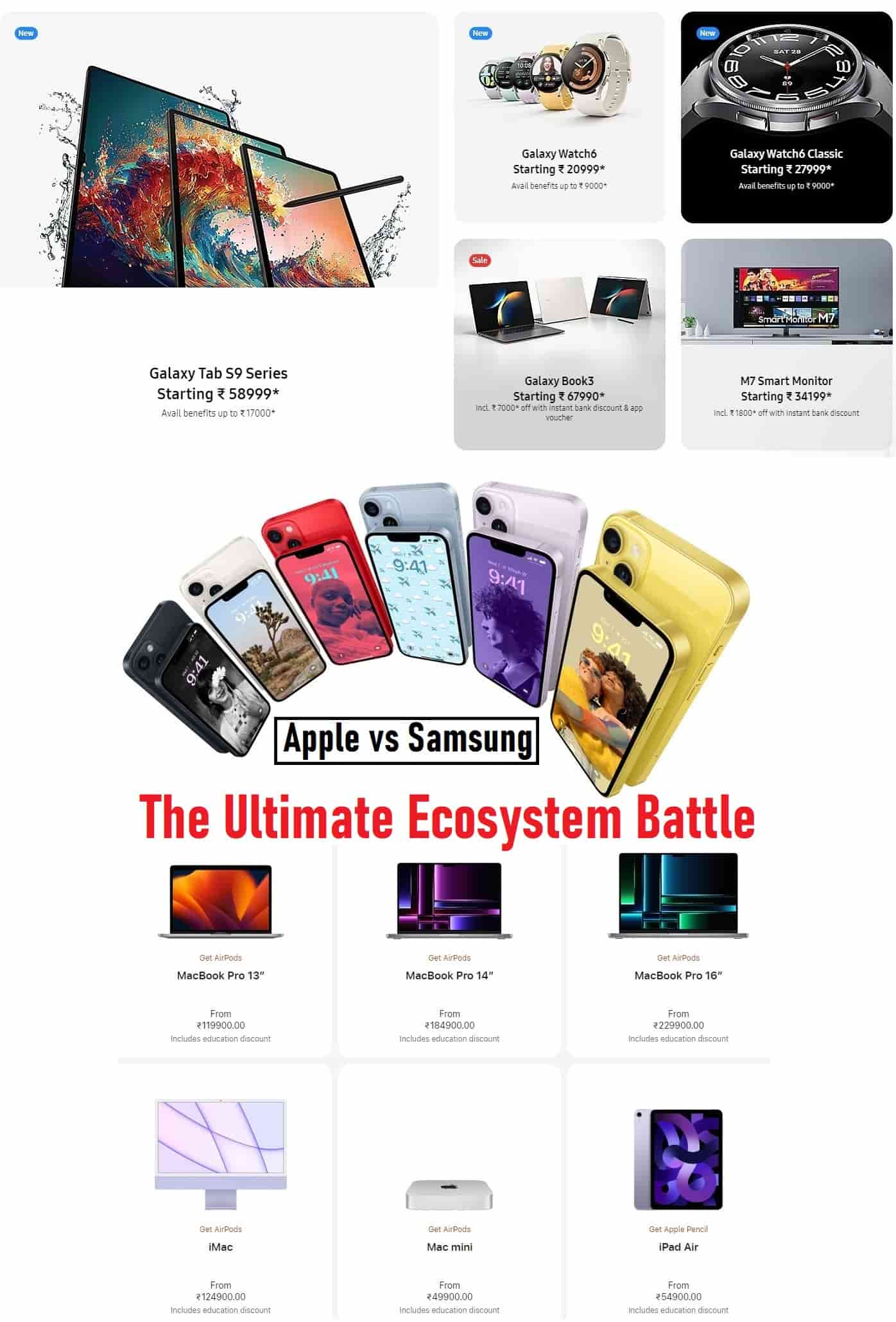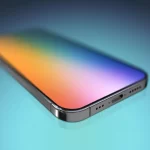Apple and Samsung dominate the smartphone industry with their own distinct ecosystems. But which ecosystem truly reigns supreme? This in-depth comparison examines the key devices, features and services that define the Apple world vs the Samsung galaxy.
The Ecosystem Hardware
To assess the ecosystems, I compared flagship devices from each company:
Apple
- iPhone 14 Pro
- Apple Watch Series 8
- AirPods Pro
- 14″ MacBook Pro
- 12.9″ iPad Pro
Samsung
- Galaxy S23 Ultra
- Galaxy Watch 5 Pro
- Galaxy Buds 2 Pro
- Galaxy Book 3 Ultra
- Galaxy Tab S8
These represent the core hardware that shapes each ecosystem experience. Now let’s dive into the major factors that set Apple and Samsung apart.
File Sharing
Seamlessly transferring files like photos between devices is key.
- Apple Airdrop makes sharing extremely easy between iOS/MacOS devices. Tap share, select contact, transfer complete.
- Samsung Quick Share enables simple sharing between Galaxy devices.
Advantage: Apple’s ubiquity gives it the edge for convenient local sharing.
But Samsung offers flexible Link Sharing to send files to non-Samsung users too.
Continuity Camera
A killer Apple exclusive is Continuity Camera:
- Uses iPhone as Mac webcam for insanely better video quality.
- Just position iPhone behind Mac pointed at you for instant upgrade.
Samsung has no equivalent. Huge win for Apple ecosystem here.
Desktop Experience
Converging mobile and desktop environments is powerful:
- Samsung Dex enables using Galaxy phone as desktop UI when connected to a monitor.
- Dex gives your phone continuity with big screens for work and productivity.
- Apple oddly lacks any version of this experience. Major hole versus Samsung.
Cross-Device Workflows
Multitasking across multiple devices unlocks efficiency:
- Apple Universal Control – use one mouse/keyboard seamlessly between Mac and iPad.
- Samsung Multi Control – similar mouse/keyboard sharing between Galaxy devices.
- Samsung also enables this between phone and PC for next-level integration.
Device Management
Keeping tabs on gadgets is easier within each ecosystem:
- Apple Find My locates Apple devices using huge iOS network. Also works with AirTags.
- Samsung SmartThings Find tracks Galaxy devices. Integrated with wider SmartThings ecosystem.
Apple’s massive installed base gives it the tracking network advantage today.
Voice Assistants
Default assistants are central to the experience:
- Apple pushes Siri as the voice assistant across devices. No option for alternatives.
- Samsung has Bixby built-in, but also flexibly supports Google Assistant. Major upside.
Google Assistant is far smarter than either Siri or Bixby. Samsung’s openness wins.
Mobile Payments
Payment integration is shaping up into a key battleground:
- Apple Pay enables tap-to-pay with iPhone/Watch. Store cards, tickets, IDs seamlessly.
- Samsung Pay also offers tap-to-pay. Previously worked with nearly all terminals using MST technology.
- Samsung now limited to NFC like Apple but has broader smartwatch support.
Slight edge to Apple Pay for convenience today. But Samsung was more universally compatible in past.
Smart Home Control
Controlling and integrating smart home devices:
- Apple HomeKit ties into Apple ecosystem, but lacks wide compatibility.
- Samsung SmartThings natively integrates with Samsung TVs, appliances, IoT devices.
Samsung’s much broader smart home hardware ecosystem is a huge advantage here.
Messaging
Seamless communication is essential:
- Apple iMessage and FaceTime are hugely popular in US. Seamless Apple-only communication.
- Samsung Messages has gotten better with RCS support for modern messaging features.
Apple’s traction makes iMessage sticky. But RCS is the open standard that Android is aligned on.
Ecosystem Philosophies
Fundamentally different approaches:
- Apple pushes tight integration and continuity between devices for seamless experience.
- Samsung champions flexibility – customizing your devices and components.
Apple’s walled garden vs Samsung’s open ecosystem. Neither is inherently better.
Recommended Ecosystem Devices
| Product | Apple | Samsung |
|---|---|---|
| Phone | iPhone 14 Pro | Galaxy S23 Ultra |
| Watch | Apple Watch Series 8 | Galaxy Watch 5 Pro |
| Earbuds | AirPods Pro 2 | Galaxy Buds 2 Pro |
| Laptop | 14″ MacBook Pro | Galaxy Book 3 Ultra |
| Tablet | 12.9″ iPad Pro | Galaxy Tab S8 |
Apple vs Samsung Ecosystem Scorecard
Based on this comparison, here is how the ecosystems stack up:
| Category | Winner |
|---|---|
| Seamless File Sharing | Apple |
| Using Phone Camera on PC | Apple |
| Converging Mobile + Desktop | Samsung |
| Cross-Device Workflows | Tie |
| Device Tracking Network | Apple Today |
| Voice Assistant Flexibility | Samsung |
| Mobile Payments | Tie |
| Smart Home Ecosystem | Samsung |
| Messaging | Tie |
Result: It’s a tie.
Each ecosystem wins in key areas. Choose based on which features you value most.
Which Ecosystem is Best For You?
Answering this depends on your priorities:
Choose Apple ecosystem if you value:
- Tight integration between devices
- Continuity features like Airdrop, Handoff etc.
- Having the same default apps across devices
- The ubiquity of iMessage in US
Choose Samsung ecosystem if you want:
- Ability to customize components like assistant
- More open ecosystem that integrates outside brands
- Wider range of device options
- Native deep smart home integrations
Neither choice is definitive – both offer great experiences. Focus on your unique needs and preferences.
Frequently Asked Questions
Can you use Apple devices with Samsung and vice versa?
Yes, you can mix and match to a degree. For example, AirPods work fine with Galaxy phones. But you may lose some deeper integrations.
Is the Apple Watch compatible with Android phones?
Unfortunately no. The Apple Watch is currently only compatible with iPhones due to relying on deep iOS integration features.
Can iMessage be used on Android devices?
No. Apple has not created any version of iMessage for Android. It only works between Apple devices currently.
Which assistant is better – Siri or Bixby?
Google Assistant is smarter than both. Bixby is Samsung’s weakest ecosystem element. Siri has improved but still behind Google.
What happens if you switch from iOS to Android?
Switching ecosystems means losing certain integrations like iMessage. You’ll need to rely more on cross-platform apps and services.
Is AirDrop better than Quick Share for file transfers?
AirDrop is faster and works seamlessly between more devices. But Quick Share is still very quick and easy between Galaxy devices.
Can you control smart home devices cross-platform?
Most smart home brands work with both iOS and Android for basic control. But you may lose deeper integrations mixing ecosystems.
Does Apple limit features to force ecosystem lock-in?
Apple prioritizes features that retain users. But ultimately both Apple and Samsung try to make switching harder once you buy in.
Which ecosystem gives better privacy protections?
Apple has built strict privacy and security into their ecosystem. Samsung still lags Apple in limiting data collection across their services.
Summary
The Apple and Samsung ecosystems both offer great integration benefits once you buy into their world. Choosing which is best for you depends on weighing their respective strengths and weaknesses.
Neither choice is permanent so don’t stress – you can always change directions later as your needs change. Focus on the features and services you find most essential to get the best experience.















